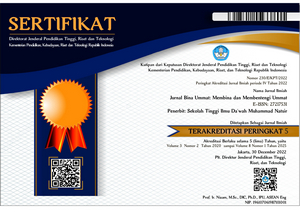PROBLEMATIKA MEDIA MASA DALAM DA’WAH
DOI:
https://doi.org/10.38214/jurnaldawahstidnatsir.v2i02.56Keywords:
Media Sosial, Media Massa, Da’wah, ProblematikaAbstract
Penelitian ini bertujuan untuk mengungkap problematika media massa dalam da’wah. Metode Penelitian: Kualitatif. Hasil Penelitian: Media masa menempati tempat strategis dalam membangun paradigma manusia secara masif. Media masa memiliki kekuatan yang jauh lebih ampuh dari senjata perang. Maka sangat sulit bagi umat Islam untuk mampu bersaing jika mereka tidak memiliki media massa sebagai wasilah da’wah. Tentu ini menjadi problem besar dalam gerakan da’wah. Akan tetapi, perkembangan teknologi daring yang sangat pesat ini menjadikan Media masa memiliki pesaing yang tangguh. Pesaing Media Massa saat ini adalah Media Sosial. Salurah komunikasi daring yang bebas dimiliki siapa saja, dengan latar belakang apa saja. Maka pada posisi ini, da’wah Islam sangat diuntungkan dan memungkinkan untuk berperan secara strategis membangun dan membentuk paradigma manusia tentang da’wah Islam.
Published
Versions
- 2024-08-25 (5)
- 2020-06-25 (1)
Issue
Section
Copyright (c) 2020 Imam Taufik Alkhotob Alkhotob

This work is licensed under a Creative Commons Attribution 4.0 International License.
This work is licensed under a Lisensi Creative Commons Atribusi 4.0 Internasional.
Authors who publish with this journal agree to the following terms:
- Authors retain copyright and grant the journal right of first publication with the work simultaneously licensed under a Creative Commons Attribution License that allows others to share the work with an acknowledgment of the work's authorship and initial publication in this journal.
- Authors are able to enter into separate, additional contractual arrangements for the non-exclusive distribution of the journal's published version of the work (e.g., post it to an institutional repository or publish it in a book), with an acknowledgment of its initial publication in this journal.
- Authors are permitted and encouraged to post their work online (e.g., in institutional repositories or on their website) prior to and during the submission process, as it can lead to productive exchanges, as well as earlier and greater citation of published work (See The Effect of Open Access).













